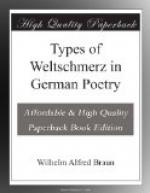But the fact that Heine never created a monumental literary work of enduring worth is not attributable solely to a fickleness of artistic purpose or lack of will-energy. We find its explanation rather in the poet’s own statement: “Die Poesie ist am Ende doch nur eine schoene Nebensache."[270] and to this principle, consciously or unconsciously, Heine steadily adhered. Certain it is that he took a much lower view of his art than did Hoelderlin or Lenau. Hence we find him ever ready to degrade his muse by making it the vehicle for immoral thoughts and abominable calumnies.[271]
The question of Heine’s patriotism has always been a much-debated one, and must doubtless remain so. But whatever opinion we may hold in regard to his real attitude and feelings toward the land of his birth, this we shall have to admit, that there are exceedingly few traces of Weltschmerz arising from this source. Genuine feeling is expressed in the two-stanza poem “Ich hatte einst ein schoenes Vaterland"[272] and also in “Lebensfahrt,"[273] although this latter poem illustrates a characteristic of so many of his writings, namely that he himself is their central figure. It is the sublime egoism which characterizes Heine and all his works. No wonder, then, that one of his few “Freiheitslieder” refers to his own personal liberty.[274] For the failings of his countrymen he is ever ready with scathing satire,[275] he grieves over his separation from them only when he thinks of his mother;[276] and in regard to the future of Germany he is for the most part sceptical.[277] In a word, Heine’s lyric utterances in regard to his fatherland are of so mixed a character, that altogether aside from the question of the sincerity of his feeling toward the land of his birth, certainly none but the blindest partisan would be able to discover more than a negligible quantity of Weltschmerz directly attributable to this influence.
Heine’s conscience is at best a doubtful quantity. Where Byron with a sincere sense and acknowledgment of his guilt writes:




